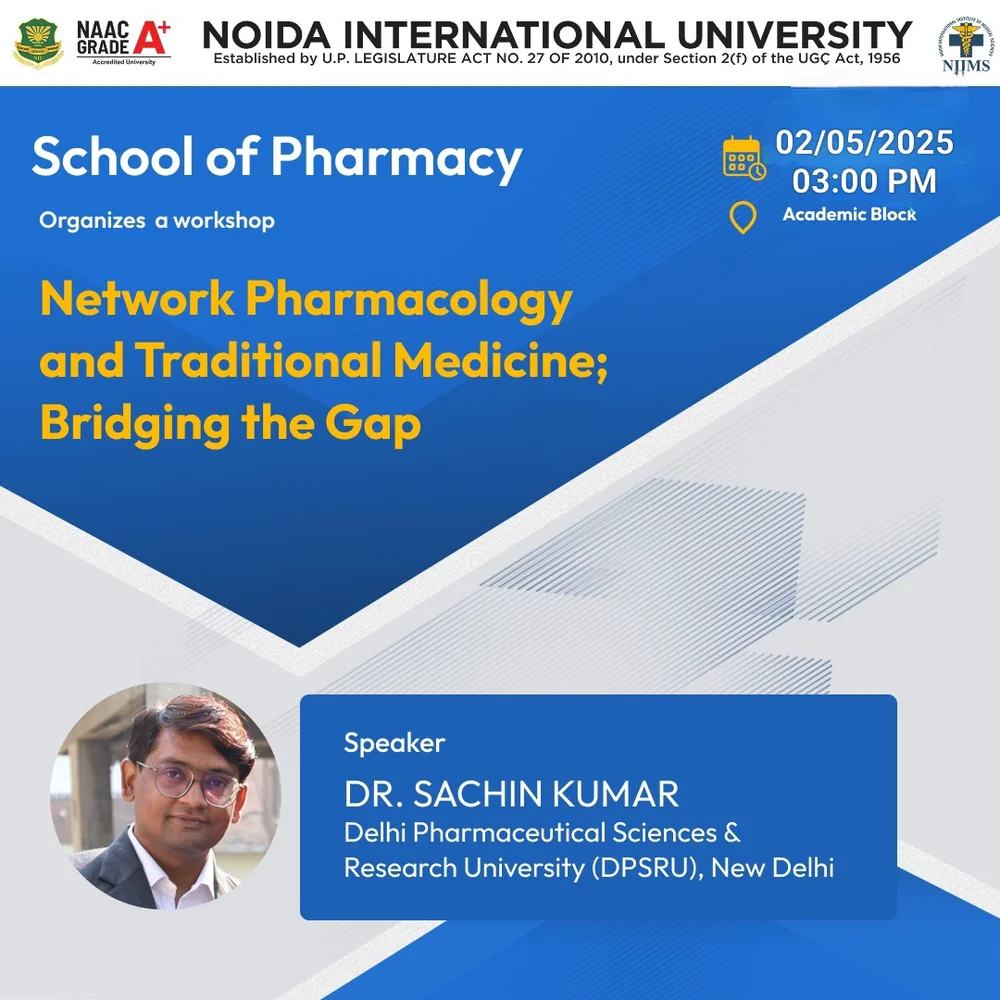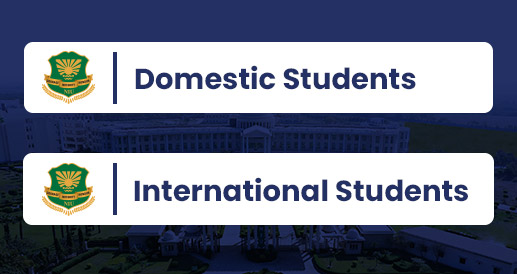Date: 2nd May 2025
Time: 3:00 PM onwards
Mode: Online
Venue: Academic Block, School of Pharmacy, Noida International University
Introduction
The workshop on “Network Pharmacology and Traditional Medicine: Bridging the Gap” was held on 2nd May 2025 in an online mode, hosted virtually from the Academic Block. The event brought together professionals, researchers, faculty, and students from diverse backgrounds including pharmacology, traditional medicine, bioinformatics, and integrative healthcare. This timely initiative aimed to explore how the modern systems-based approach of network pharmacology can synergize with the time-tested wisdom of traditional medicine systems such as Ayurveda, Traditional Chinese Medicine (TCM), Siddha, and others.
The overarching goal of the workshop was to foster interdisciplinary dialogue and collaborative exploration in order to scientifically validate traditional formulations and enhance their relevance in contemporary drug discovery and personalized medicine.
Objectives of the Workshop
The primary objectives of the workshop were:
- To introduce the foundational concepts of network pharmacology and its application in drug discovery.
- To highlight the value of traditional medicine systems in therapeutic innovations.
- To demonstrate how network pharmacology can be used to decode complex herbal formulations.
- To explore case studies where traditional remedies have been examined through systems biology approaches.
- To encourage collaborative research initiatives among scientists, clinicians, and traditional medicine practitioners.
Workshop Proceedings
The session commenced at 3:00 PM with a formal welcome address by the DR. SACHIN KUMAR, Asst. Professor (Delhi Pharmaceutical Sciences & Research University (DPSRU), New Delhi), who emphasized the importance of bridging modern science with traditional wisdom. The audience was then introduced to the theme of the workshop, highlighting the global trend toward integrative health practices and the increasing use of multi-component herbal formulations.
Technical Sessions
The workshop was divided into three technical sessions
Technical Session 1: Understanding Network Pharmacology
The session covered:
- Fundamentals of network pharmacology and systems biology.
- Tools and databases used in network pharmacology (e.g., STRING, TCMSP, Cytoscape).
- The role of Artificial Intelligence and Machine Learning in target prediction.
Dr. Sachin introduced participants to the concept of polypharmacology, explaining how network pharmacology moves away from the “one drug-one target” model to a more integrated “multi-compound-multi-target” approach. He also provided a hands-on walkthrough using Cytoscape to model compound-target networks.
Technical Session 2: Traditional Medicine Meets Modern Tools
Topics discussed:
- Bioinformatics tools for analyzing herbal formulations.
- Mechanistic insights into Ayurveda and TCM-based remedies through network pharmacology.
- Case studies where Ayurvedic rasayanas and TCM decoctions were mapped to protein interaction networks.
Technical Session 3: Bridging the Gap – Challenges and Opportunities
Key issues addressed included:
- The lack of comprehensive phytochemical databases for traditional systems.
- Challenges in standardizing multi-herb formulations.
- Ethical and intellectual property issues in validating and commercializing traditional knowledge.
- Opportunities for integrative research projects and policy-level initiatives.
Interactive Q&A and Participant Feedback
- An interactive Q&A session allowed participants to engage directly with the speakers. Many attendees expressed interest in how to practically apply network pharmacology tools to their own research. Questions ranged from computational methodologies to the role of AI in predicting herb-drug interactions.
- The participants’ feedback was overwhelmingly positive. Many reported that the workshop expanded their understanding of both traditional medicine and modern pharmacological methods. Students especially appreciated the hands-on demonstrations and real-world case studies.
Outcomes and Takeaways
Key takeaways from the workshop included:
- A reinforced understanding that traditional medicine is not in conflict with modern science, but rather offers untapped potential when studied with robust methodologies like network pharmacology.
- Recognition that network pharmacology provides a scientific lens to decode the holistic principles embedded in traditional medicine systems.
- Awareness of key resources, tools, and databases available to explore compound-target-disease relationships.
- The importance of creating standardized ontologies and digital libraries to document and research traditional formulations.
- A call for collaborative research, especially among pharmacologists, traditional practitioners, bioinformaticians, and regulatory agencies.
Conclusion
- The workshop “Network Pharmacology and Traditional Medicine: Bridging the Gap” successfully fulfilled its aim of fostering a multidisciplinary dialogue around two seemingly disparate yet deeply interconnected systems of knowledge. Through insightful presentations, case studies, and discussions, the workshop underscored that the integration of traditional medicine with network pharmacology has the potential to revolutionize drug discovery, improve personalized medicine, and offer comprehensive therapeutic solutions.
- Participants left with not only enhanced knowledge but also with a sense of purpose—to contribute to a more inclusive, evidence-based, and integrative approach to healthcare. The organizers concluded the workshop with a vote of thanks, expressing hope that this would be the first of many collaborative initiatives aimed at uniting the ancient and the modern in the pursuit of better health outcomes for all.


